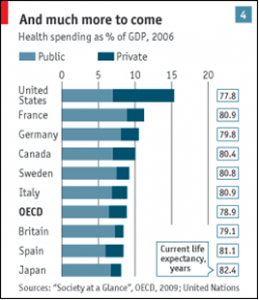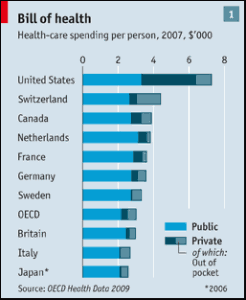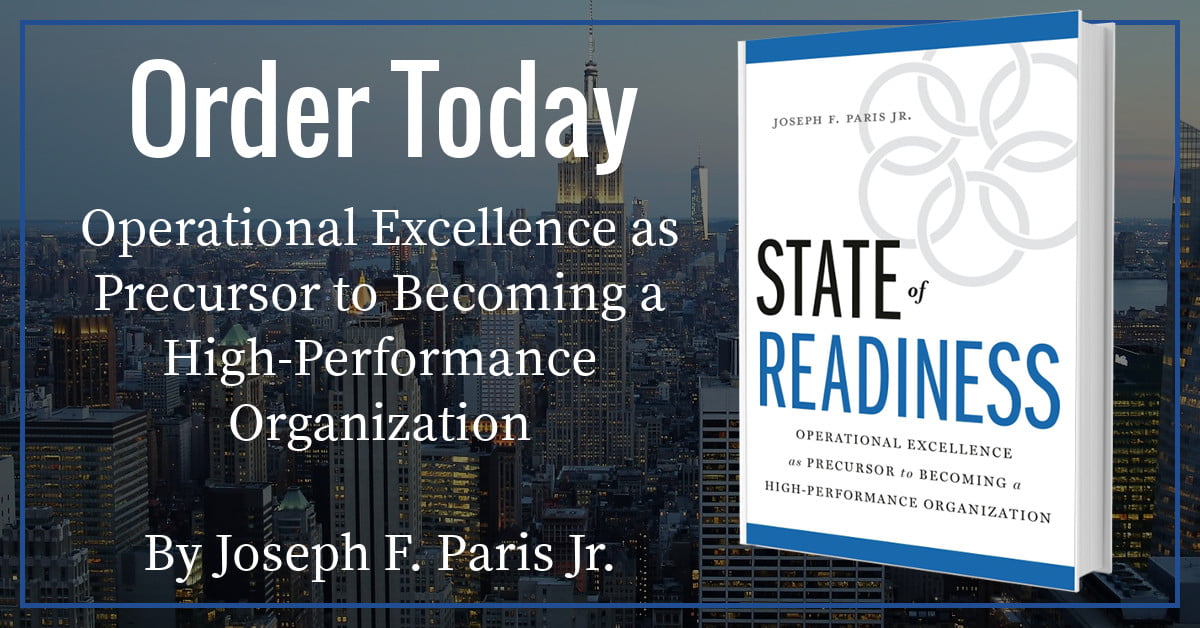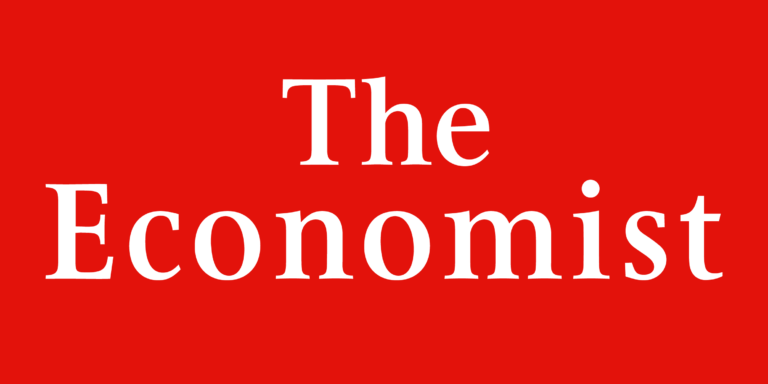Weighing in on Healthcare
I have refrained from discussing Healthcare in my articles because the topic is so politically polarized. If I say that I am “for” healthcare reform, I am labeled a “socialist” (or worse) who is against free-markets – and if I say that I am against healthcare reform, then I am a heartless free-market capitalist.
I wonder, “Why the labels”?
Can’t there be a frank and open dialog based upon facts and pragmatism? Why must the arguments be fear-based? Why the lies and exaggerations (from all sides)? Why must there be an “us” and a “them” against one another instead of everyone working the problem?
It’s virtually impossible for the average person to get the facts from the news in theUnited States. The “talking heads” on MS-NBC and FOX News (among others), the various radio pundits, and even the printed press – all appear keen on instilling and perpetuating fear. I sure miss Walter Cronkite and Tim Russert.
Over the years, I have settled on a few sources which I believe are reliable for my information. As Dragnet’s Sgt. Joe Friday used to say, “Just the facts…
For instance, I routinely go to the Central Intelligence Agency’s website for basic information on the countries I am visiting or otherwise have business or personal interests. Their “World Factbook” provides a very good briefing on the specifics and goings-on of every country. The Department of Commerce contains a plethora of content and analysis related to business and economics (both domestic to the United States and international).
For general news and information, I choose to read “The Economist” and “Reuters”. I find the content from both sources to be very well researched and truly “fair and balanced”.
As a business owner and for the past fifteen (15) years, I have seen the cost of health insurance for my employees increase a MINIMUM of ten-percent (10%) per year – usually it’s closer to twelve-percent (12%). With inflation holding steady at three-percent (3%) or less over the last fifteen years and real wages staying stagnant for the past three years, the increase in the cost of health insurance is ridiculously outpacing the increase in income. It is mathematically unsustainable.
And just as reliably, I see the coverage decreased year-on-year. The “co-pays” go up, the deductibles are increased, and some services are reduced or dropped completely. Most of the increases in coverage, if any, are usually the result of some piece of legislation (either State or Federal).
During the summer of 2009, the political rhetoric from both our elected leaders and the media regarding healthcare reform was particularly acrid and at a fever pitch. It was (and still is) virtually impossible to separate fact from opinion (or even from fiction). It was during this time that “The Economist” came out with an edition that had the timely focus on healthcare in general (concerns and forecasts from around the world) and in the United States in particular.
What completely SHOCKED me are the next two (2) graphs compiled from data obtained from the Organization for Economic Co-operation and Development (OECD) – of which the United States has been a member since 1961. What it clearly showed me was:
- As a percent of Gross Domestic Product (GDP), the United States spends almost 50% more on healthcare than the next closest country (France) and greater than 50% more on healthcare than the OECD average.
- Although the United States spends almost 50% more as a percent of GDP than France on healthcare, the average life expectancy in France is a full three (3) years greater than that of the United States.
- Although the United States spends greater than 50% more as a percent of GDP on healthcare than the OECD average, the average life expectancy in the United States is a full year less than the OECD average (and the lowest of ALL OECD members).
- The United States spends 100% more as a percent of GDP than Japan on healthcare, however, the United States has an average life expectancy of almost 5 years less.
- As a percent of GDP, the United States spends approximately as much “public money” on healthcare as the OECD average.
- Per person, the United States spends 50% more than the next closest OECD member (Switzerland) and almost 66% more than the OECD average.
- Per person, the United States spends approximately as much “public money” on healthcare as the OECD average.
- All of the other OECD countries listed perform in a “narrow band” on healthcare spending – 8%-11% of GDP versus 15.5% of GDP for the United States. And $2,250-$4,250 per person versus $7,250 per person for the United States.
 |  |
| From “The Economist”, Jun 25th2009“A special report on ageing populations: A world of Methuselahs” | From “The Economist”, Jun 25th2009“Reforming American healthcare: Heading for the emergency room” |
In summary, the United States spends a magnitude more – both per person and as a percent of GDP – yet has the lowest life expectancy of any other OECD member. AND the United States is the only OECD member that does not have universal, government-run healthcare.
Let’s face it – if these were “employees” and not countries listed, the United Stateswould have been terminated long ago for grossly poor performance.
And I am sure that some of you might be thinking that the numbers are off and it’s not as bad as the graphs would have you believe. I am even willing to agree with that assertion. But how far can they reasonably be off – 5%? Perhaps a statistically egregious and unlikely 10%? Even then, healthcare in the United States is out-of-bounds, broken and unsustainable.
The leadership of the United States must come to two realizations. The first is that the healthcare that we have is FUBAR from end-to-end. And the second is that something dramatic – challenging the system fundamentals to their core – must be done.
I understand the apprehension with regards to passing a Federal Law that governs healthcare; their track record with Social Security, Medicare, and Sarbanes-Oxley are not instillers of confidence. As a business owner who travels often and has overseas interests – I have seen, first hand, how inefficient and ineffectively government functions (not just in the United States).
I am also certain that the private sector would be able to provide most services quicker and at a fraction of the cost – perhaps with some basic “humanitarian” government mandates such as: not being able to cancel your policy if you get sick, and no exclusions for pre-existing conditions… and the like.
The system is broken – and on the verge of a systemic melt-down.
We have to define a “national policy”, not the means by which it is implemented – but rather the minimum requirements. Some suggestions:
– 100% health insurance coverage. I am not speaking of how this is done – but that it is done. Everybody in America, or
entering America, must have health insurance coverage. There are no “opt-outs”. For those who cannot afford coverage,
there will be a sliding government subsidy based upon income and ability to pay.
– A person cannot be denied coverage for a pre-existing condition and their coverage cannot be terminated if they become ill.
I do believe there should be “up-charges” for “risky behavior” – such as smoking and being overweight – but not issues
beyond an individual’s control, such as those whose origins might be genetic. There is precedent for these upcharges in
every other insurance product such as: life, home, auto, etc…
As for cost savings, there are several ideas;
– Throw out all outdated regulations and processes based upon past practices and what is known. Question EVERYTHING.
– Standardize claims processing. The claims processing for healthcare providers should feed a single, standardized
information system. The same system used for Medicare and Medicaid should be the same system the insurance
companies use – just the insurer / payer is different.
– While we are at it, mandate the use of electronic medical files in a standardized format so they can be easily shared.
Don’t wait for an international standard – it will never happen.
– Standardize regulations. Much like the Uniform Commercial Code (UCC), perhaps there should be a Uniform Healthcare
Code (UHC) which governs the rules of engagement across state lines.
– As an extension of the UHC (above), set national financial and service standards for health insurance companies so that
they can sell their policies across state lines. This would facilitate the consolidation of smaller insurance companies so that
economies of scale can be more easily realized and grow the competitiveness of the industry – nothing brings costs down,
and increases service, more than competition.
– Open-up competition for pharmaceuticals. Allow people to purchase them from sources outside of the country. I can’t
be convinced that the pharmaceuticals from Canada, the UK, France or Germany are not every bit as good and safe as those
in the United States.
– Perhaps even consider “medical tourism”. Like it or not, it’s a global economy. And just remember, the first heart transplant
occurred in South Africa in 1967 – so it is arrogant and wrong to think that the United States is the “standard bearer” of
healthcare (the graphs above deftly demonstrated this).
– There must be tort reform. Healthcare is an inexact science – and until we are all cyborgs – always will be. As such, we
should all expect a variety of mistakes and oversights to be made in the diagnosis and delivery of healthcare. Therefore, my
suggestion would be to cap awards for instances of negligence. It is only when gross negligence is involved (a much higher
threshold) that there should be no cap.
The leadership of the United States (both the Executive AND Legislative branches) should communicate effectively – this has
not occurred during the entirety of the healthcare debate. And most important, they should not try to fix the entire industry in a single bill – it’s too complex a problem. Remember the saying, “The moving of the mountain begins with the picking-up of the first stone – you can’t move the mountain for the mountain.” Craft targeted legislation that incrementally builds a program to an end.
People dislike their insurance companies – but at least the insurance companies communicate. Every year, I get my health insurance policy. It is twenty (20) pages long (most of it in grid form) and clearly outlines my coverage and how much the policy costs. It is not a 1,000pg-plus “Rube-Goldberg” of a document like is being banded about in Washington, DC.
This is why the resistance to healthcare reform is so strong. We don’t know what we are getting and how much it will cost. “The devil you know is better than the devil you don’t know”.
Also, it doesn’t help that the laws are being drafted by attorneys – which only other attorneys can understand (and even then, probably not). It’s rather sad that nothing has been learned since the time of Shakespeare when – in the play King Henry IV, Part-2, Act-IV, Scene-II – he boldly writes that, “The first thing we do, let’s kill all the lawyers.”
…perhaps the laws should be drafted by Industrial Engineers. Hmmm…
Personal anecdote…
A few years ago, I was on Holiday in Cape May, New Jersey with the family. My oldest son had some bad seafood at a restaurant known for its fine seafood cuisine and took ill late in the evening. After thirty minutes of aspiration in the hotel room, my wife decided that medical attention was necessary and that I should take him to the emergency room at the regional hospital.
My dissenting opinion was to let nature run its course as designed. After all, the reaction was swift and enthusiastic which told me that the body was rejecting the toxins expeditiously, rather than slowly taking ill which is normally a sign of something more dramatic and sinister.
My dissenting opinion was politely considered and deftly dismissed…
So at 1 o’clock in the morning, I took my son – and a waste-can lined with a plastic bag – in search of the regional hospital.
When I arrived at the hospital, it was largely empty. There were no patients or families sitting in the waiting room. There were no ambulances waiting to unload a patient. It was just my son, myself, the waste-can, and the attendant sitting at reception.
I went up to the attendant and explained the situation. She politely instructed me to wait and “someone” would be with us “shortly”. We had waited for fifteen (15) minutes when she looked up from her computer and asked us to come over so that she could obtain some information. Mind you, she had not moved, she had not answered the telephone, and nobody else had come into the room – for the full time we were sitting there.
She politely instructed me to wait and “someone” would be with us “shortly”. We had waited for fifteen (15) minutes when she looked up from her computer and asked us to come over so that she could obtain some information. Mind you, she had not moved, she had not answered the telephone, and nobody else had come into the room – for the full time we were sitting there.
She took our information and asked that we be seated and, again, “someone” will be with us shortly.
After another thirty (30) minutes, she called us again and – this time – opened the glass door so that we could enter. She then pivoted on her chair 90-degrees, opened a sliding-glass window, proceeded to take additional information. Once gathered, she escorted us into the next room where “someone” would be with us shortly.
During this entire time – forty-five (45) minutes, not another soul had entered the rooms. She had not left her station. The telephone had not rung.
We sat in the second room for another fifteen (15) minutes before another person came to us. He asked us the same questions the attendant had asked and then escorted us to a bed in the emergency room. As he departed, he said that “someone” would be with us shortly.
 My son and I sat there for another hour – without ANYONE coming to visit or otherwise inquiring as to how we were doing. I finally looked at my son – who had long since stopped aspirating – and asked him how he was feeling. He looked at me and said he was feeling much better (he looked much better) and asked how much longer we had to stay.
My son and I sat there for another hour – without ANYONE coming to visit or otherwise inquiring as to how we were doing. I finally looked at my son – who had long since stopped aspirating – and asked him how he was feeling. He looked at me and said he was feeling much better (he looked much better) and asked how much longer we had to stay.
I told him that we were departing this very moment – leave the waste-can.
In all, we spent almost two (2) hours in an Emergency Room, with not a single other patient, and had received NO medical attention. This was, by far, the worst medical care I had ever experienced in my travel-filled life. Even worse than in several “developing” countries which I have had the opportunity to visit.
 Some weeks later, I received a “bill for services” in the amount of several hundred dollars. I politely recounted my experience at the hospital – as I have expressed in this article – and I let the billing department know that there would be no circumstances in which I would voluntarily pay this bill. And, although I have health insurance, there were no circumstances where I would provide the information so that my insurance company could be billed.
Some weeks later, I received a “bill for services” in the amount of several hundred dollars. I politely recounted my experience at the hospital – as I have expressed in this article – and I let the billing department know that there would be no circumstances in which I would voluntarily pay this bill. And, although I have health insurance, there were no circumstances where I would provide the information so that my insurance company could be billed.
I eventually received a letter from the hospital telling me that they were “forgiving” my charges. How very kind of them…
And so it goes…
 Paris is the Founder and Chairman of the XONITEK Group of Companies; an international management consultancy firm specializing in all disciplines related to Operational Excellence, the continuous and deliberate improvement of company performance AND the circumstances of those who work there – to pursue “Operational Excellence by Design” and not by coincidence.
Paris is the Founder and Chairman of the XONITEK Group of Companies; an international management consultancy firm specializing in all disciplines related to Operational Excellence, the continuous and deliberate improvement of company performance AND the circumstances of those who work there – to pursue “Operational Excellence by Design” and not by coincidence.
He is also the Founder of the Operational Excellence Society, with hundreds of members and several Chapters located around the world, as well as the Owner of the Operational Excellence Group on Linked-In, with over 25,000 members.
For more information on Paris, please check his Linked-In Profile at: http://de.linkedin.com/in/josephparis









